Who Am I?
My name is Karen Fullowka. I was first exposed to Pokemon TCG 17 years ago. Back then all I did was collect the cards. It wasn’t until my husband taught me, that I learned to actually play the card game in 2009,when we had a card store of our own. I learned to play World of Warcraft, Magic: The Gathering, Pokemon, Yu-Gi-Oh, and Vampire: The Eternal Struggle. Over the years I only kept playing Pokemon because I found it to be a fun game with enough challenge in the deck building and execution to keep my interest. And in all honesty I’m a sucker for the cuteness of the Pokemon. I like the simpler nature of the game compared to Magic. Unravelling a stack of effects and counter effects in Magic verged on hurting my head most times. The fact that it is marketed “for kids” doesn’t bother me at all. My inner child likes what it likes.
Pokemon TCG
While I’m sure Pokemon needs no introduction, the specifics of the Trading Card Game might be less well known. For those unfamiliar with how the Pokemon Trading Card Game works, here is a brief description of the game and how it’s played.
The object of the game is to play your Pokemon cards to battle against an opponent’s Pokemon cards. The first player to “Knock Out” (defeat) six opposing Pokemon wins the game. Your deck of 60 cards consists of your Pokemon, Trainer cards and Energy cards.
The Pokemon
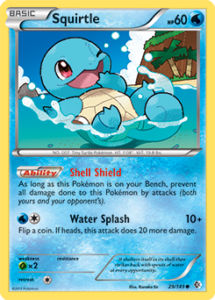
Basic Pokemon
This is a ‘Basic’ Pokemon. You can play any number of ‘Basic’ Pokemon on your turns as long it does not exceed your bench (5 Pokemon).
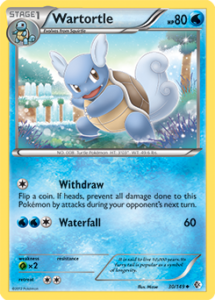
Stage 1 Pokemon Evolution
This is a ‘Stage 1’ Pokemon. You can evolve, play from your hand, any number of ‘Stage 1’ Pokemon on top of ‘Basic’ Pokemon that are represented in the top left corner on your turn.
However, you can only evolve a ‘Basic’ Pokemon if it has been your ‘Active’ Pokemon or on your ‘Bench’ since the beginning of your turn AND this is not your First Turn of the game.
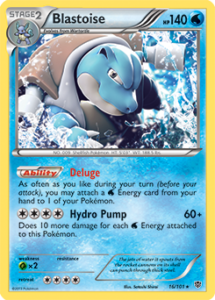
Stage 2 Pokemon Evolution
This is a ‘Stage 2’ Pokemon. You can evolve, play from your hand, any number of ‘Stage 2’ Pokemon on top of ‘Stage 1’ Pokemon that are represented in the top left corner on your turn.
However, you can only evolve a ‘Stage 1’ Pokemon if it has been your ‘Active’ Pokemon or on your ‘Bench’ since the beginning of your turn AND this is not your First Turn of the game.
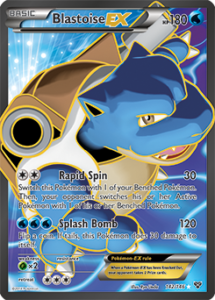
EX Pokemon
This is an ‘EX’ Pokemon. These are interesting versions of Pokemon, but the cool thing about them is that they are all considered ‘Basic’ Pokemon. They are usually incredibly strong for being ‘Basic’ Pokemon, but due to this they also award your opponent TWO prizes cards when they are ‘Knocked Out’

GX Pokemon
This is a ‘GX’ Pokemon. Similar to ‘EX’ Pokemon they are stronger versions of the appropriate Pokemon. However, these Pokemon are not necessarily ‘Basic’ Pokemon. But, they all have one thing in common: A ‘GX’ Ability that is so powerful it can only be used once per game! These Pokemon also have the same downside as the ‘EX’ Pokemon, they award two prizes if they are ‘Knocked Out’
Notes About Evolution:
- The Evolved Pokemon retains any damage it had previously received.
- The Evolved Pokemon retains any energies previously placed on it.
- The Evolved Pokemon REMOVES any special conditions (Paralyzed, Confused, Asleep, etc) on it.
Trainer Cards
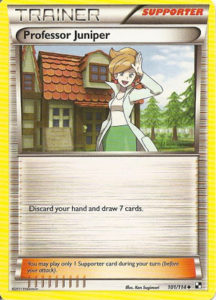
Supporter Cards
Supporter cards are indicating by the word ‘Supporter’ in the top right corner. Regardless of the name of the card you can only play 1 ‘Supporter’ per turn. It’s best to place the ‘Supporter’ card next to your ‘Active’ Pokemon to remind you that you’ve played one for the turn.
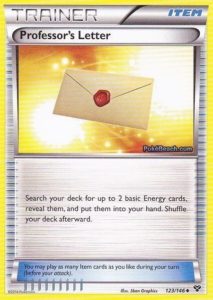
Item Cards
Item cards are indicating by the word ‘ITEM’ in the top right corner. You can play any number of ‘ITEM’ cards on your turn.
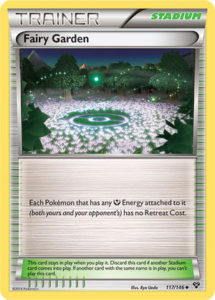
Stadium Cards
Stadium cards are indicating by the word ‘STADIUM’ in the top right corner. Stadium cards are unique trainers that DO NOT go to your discard pile after they are played. They will stay in play until either you or your opponent play another ‘Stadium Card’. Both players can use the Stadium card regardless of who played it.
Energy Cards
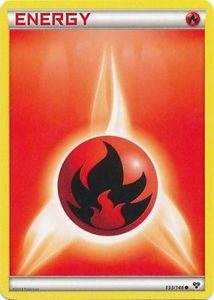
Energy cards act as the resources in the game, they are required for your Pokemon to do their Attack Moves. There are eleven energy types in the game: Grass, Fire, Water, Electric, Fighting, Psychic, Darkness, Metal, Dragon, Fairy and Colourless.
Playing the Game
Pokemon TCG Setup
- Each player shuffles their 60 Card Deck
- Determine randomly who will go first (Paper/Rock/Scissors, flip a coin, or roll a dice)
- Each player draws seven cards
- Players pick a ‘Basic’ Pokemon from their hand and places it facedown in front of them. This is considered your ‘Active’ Pokemon
- If you do not have 1 ‘Basic’ Pokemon do the following:
- Reveal your hand to your opponent and show them that you do not have a ‘Basic’ Pokemon
- Shuffle your hand back into your Deck
- Restart at Step 1.
- If you do not have 1 ‘Basic’ Pokemon do the following:
- Players can also place up to five other ‘Basic’ Pokemon on their ‘Bench’.
- Six cards are taken from the top of your deck, FACE DOWN, and placed to the side. These are considered your ‘Prize’ Cards.
- Draw 1 Card for each time your opponent did not draw 1 ‘Basic’ Pokemon (Step 4).
Pokemon TCG Play
Players take alternating turns, starting with the first player determined above.
- Do any of these in any order
- Put ‘Basic’ Pokemon in play onto their Bench.
- Evolve an ‘Active’ or ‘Benched’ Pokemon
- You cannot evolve a Pokemon on your First Turn.
- Place an Energy card on one of their Pokemon (once per turn)
- Play Trainer cards
- Retreat: Have their Active Pokemon trade places with one on the Bench (usually at the cost of Energy cards).
- Attack or Pass Turn
- This is always the last action a player takes during their turn.
- Attacks can only be used if the Pokemon has enough Energy cards, of the right type, attached to it.
- If the defending Pokemon’s health points are reduced to zero it is considered ‘Knocked Out’ and do the following:
- The attacking player draws 1 prize card. (Could be 2 (EX and GX Pokemon grant you two prizes)).
- If this causes you to have drawn all six of your prize cards, you win the Pokemon Battle.
- The defending player chooses a new active Pokemon.
- If this isn’t possible the Defending Player loses the Pokemon Battle.
- The attacking player draws 1 prize card. (Could be 2 (EX and GX Pokemon grant you two prizes)).
- If the defending Pokemon’s health points are reduced to zero it is considered ‘Knocked Out’ and do the following:
There are many different varieties of Pokemon and several different forms of each one,each with different attacks and abilities, allowing for many different possible outcomes and possibilities.
Gotta collect ‘em all!
Karen Fullowka
Latest posts by Karen Fullowka (see all)
- How to Build a Pokemon Deck - March 28, 2017
- Cute But Deadly - March 25, 2017
- Who I Am and How To Play Pokemon - March 13, 2017

Leave a Reply
Want to join the discussion?Feel free to contribute!